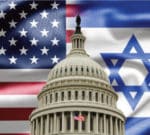EMET Strongly Applauds Secretary of State Mike Pompeo
(Washington, D.C., November 19, 2019) Yesterday, Secretary of State Mike Pompeo issued a watershed statement that demonstrated a profound degree of intellectual honesty and moral clarity regarding the issue of international law vis-à-vis the Israeli settlements. The fact is that various administrations since 1967, have had differing opinions regarding the legality of Israeli settlements. What they have based their arguments upon has been United Nations Resolution 242, which came about as a result of the 1967 conflict, when Israel was attacked on all sides and even managed to win land in its defensive war.
The wording of this resolution specifically avoids use of the article “the”, meaning Israel was never required to withdraw from all of the territories that Israel won in its defensive war of 1967 for peace. In fact, many legal scholars have argued that Israel has already fulfilled these requirements by withdrawing from all of the Sinai in 1982 and from Gaza and Jericho in 2005.
The meaning of UN Security Council Resolution 242 was totally clear to those who had drafted it.
Former Assistant Secretary of State Joseph Sisco had said, “I was engaged in the negotiation for months of that resolution. That resolution did not say ‘total withdrawal.’”
Yet this resolution has been misread and quoted and re-quoted by those who want Israel to return to the nearly indefensible boundaries of June 4, 1967, (before the outbreak of the 1967 War). Those were what former Ambassador Abba Eban of Israel’s Labor Party had called “the Auschwitz borders,” and would make Israel merely 9 miles wide in its narrowest waist.
Said President Lyndon Johnson at the time, “an immediate return to the situation as it was on June 4th is not a prescription for peace, but for renewed hostilities.” What was needed, he asserted, were “recognized boundaries, that would provide security against terror, destruction and war.”
The important thing to remember about international law is that certain principles are constantly invoked as though sacrosanct, while others are totally dismissed and ignored. And that it is not, by any means, monolithic.
While we have constantly been hearing about UN resolution 242, one rarely hears about other acts of international law, such as the Mandate for Palestine. At the San Remo Conference, in April 1920, the boundaries of what was then “Palestine” were given to the Jewish people. The resolution had been drafted by the principles of World War I – Britain, France, Italy and Japan – and included all of Jerusalem, Judea, and Samaria. It was voted upon in the League of Nations on July 24, 1922 and passed unanimously.
It has never been revoked, or formally superseded. Yet it has been almost entirely ignored.
Says EMET Founder and President, Sarah Stern, “We are profoundly grateful to Secretary of State Mike Pompeo for his intellectual honesty and moral clarity. Secretary of State Pompeo deeply understands the complexities and imprecision of invoking international law, and that it is not monolithic regarding this issue. That is reflected in his statement that ‘International law does not compel a particular outcome, nor create a legal obstacle to a negotiated resolution.’”
“The Secretary of State also understands the realities on the ground. These sobering realities include an Islamic republic of Iran that is on the march, and is trying to create a pincer-like grasp surrounding Israel on the north with its terror proxy, Hezbollah, and on the south with its support for the Sunni terror group, Hamas. He understands that Iran is the world’s leading state sponsor of terrorism. He understands the hegemonic aspirations of the Islamic Republic. He understands that every piece of land that Israel has withdrawn from, including Southern Lebanon in June of 2000 and Gaza in 2005, have been used by Iranian backed terrorist groups to launch missiles on the State of Israel.”
“He further understands that the maximalist demands of the Palestinians and their constant refusal to sit down and negotiate directly with the Israelis today will lead to their own undoing.
Invest in the truth
Help us work to ensure that our policymakers and the public receive the EMET- the Truth.


